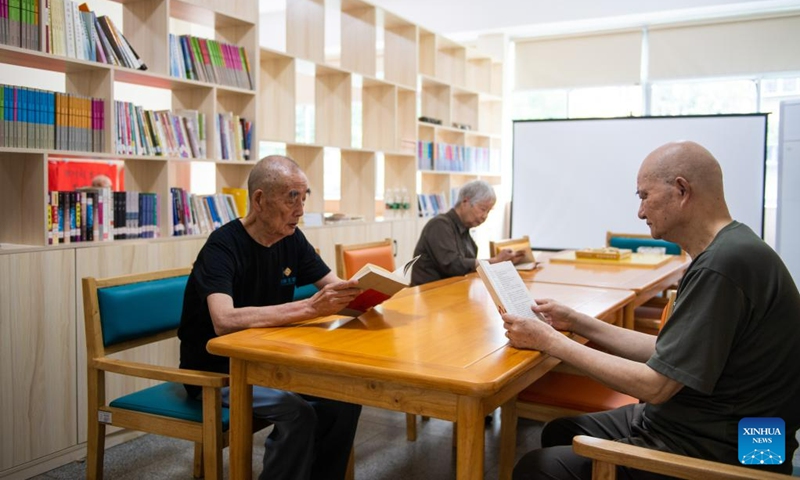Delaying retirement to the age of 65, a hot topic again as the annual two sessions approach

Senior residents read at a nursing home in Hanshou County of Changde City, central China's Hunan Province, June 20, 2023. Photo: Xinhua
With the anticipation of a shrinking workforce in China in the near future as China has experienced declining newborns over the past few years, delaying retirement is expected to become a hot topic during this year's two sessions again as a latest report on the development of China's pension estimated that the age of the postponed retirement can eventually be adjusted to 65.
China has one of the lowest statutory retirement ages among major economies, which allows men to retire at 60, white-collar women at 55 and 50 for women who work in factories, a policy unchanged since the 1950s.
However, Chinese people's average life expectancy has risen from 43.7 years in 1960 to 78.2 years in 2021.
Over the years, Chinese social security experts have warned of the threat from the depleting pension funds due to the longer life expectancy in contrast with the unchanged statutory retirement ages, in addition to the factor of China's declining birth rate.
Statistics of the newborns over the past forty years show that China's birth rate has been declining since reaching its peak in 1987.
At present, each Chinese retiree is supported by the contributions of fewer than five workers. The ratio is half what it was two decades ago and is trending toward 3-to-1 in 2030 and 2-to-1 in 2050.
Demographers and economists have warned that the current pension system, which relies on a shrinking active workforce to pay the pensions of a growing number of retirees, is unsustainable and needs to be reformed.
In terms of estimating the pension replacement rate, the China Pension Report 2023 released by the Social Security Laboratory at Chinese Academy of Social Sciences on December 29, 2023, pointed out that the introduction of a delayed retirement policy is imminent and the eventual statutory retirement age after the adjustment might be 65.
Delaying retirement is an imperative solution which many countries worldwide have similarly implemented. As the aging population problem in China is already quite challenging, it is expected to become even more critical in the future, Guan Xinping, professor from Nankai University told the Global Times on Wednesday, noting that if the retirement age is not adjusted now, the situation will become even more difficult as time goes on.
According to Guan, raising the retirement age to 65 is a reasonable adjustment according to China's national conditions based on many researches and the comparison of different plans in addition to the reference to the statistics and experience in some overseas countries and regions.
The adjustment will be a progressive, flexible and differentiated progress to raising the retirement age to 65 to be adaptable to the majority of the working people in term of different classes, income and occupations, Guan added.
Furthermore, experts pointed out that setting the same retirement age for both men and women is a long-term trend in the global sphere.
"Setting the retirement age for women five years earlier than for men was initially based on the perception that certain types of work during the industrialization period had a greater impact on women. However, with the society transitioning into a highly service-oriented one, the gender gap in the workplace has diminished. Therefore, the prevailing global practice is to set the same or similar retirement ages for men and women," Lu Ming, professor from Antai College of Economics & Management, Shanghai Jiao Tong University, told the Global Times on Wednesday, noting that a global common phenomenon, including in China, is the longer life expectancy for women.
China entered the aging society at the end of the 20th century, and the number and proportion of the elderly population have continued to grow. Statistics from China's Ministry of Civil Affairs show that by the end of 2022, the Chinese elderly population aged 60 and above reached 280 million, accounting for 19.8 percent of the total population, and the Chinese elderly population aged 65 and above amounted to 210 million, accounting for 14.9 percent of the total population, indicating that China has entered a deeply aging society. It is anticipated that China will further progress into a severely aging society by 2030 with 30 percent of the population aged over 65 years old.
Delaying retirement is an effective option for addressing the risks of an aging population, the imbalance in social pension insurance funds and maintaining intergenerational equity in policy. It can reduce the number of years a worker receives a pension, thereby decreasing the fund's expenditure, according to China Business Journal.
According to Guan, China's current pension funds are sufficient to make ends meet, except for the problem of imbalance between different regions. Places with more young working people have more funds whereas in some areas, such as the northeastern parts of the country, where young people migrate to other places with only the elderly and retired people left are faced with greater pressure from the local pension funds, Guan noted.
As the annual two sessions are approaching, the topic of raising the retirement age to 65 has been heatedly discussed on the social media platforms, with many people, especially manual workers, expressing their discontent about the adjustment. Some also proposed to refer to the healthy life expectancy indicator suggested by the WHO in considering the retirement age given that the physical strength, energy and capabilities of men of 60 or above and women of 55 or above may not meet the needs of the modern society with stressful requirements on workers.
In face of the aging population, Lu thinks that in addition to raising the retirement age, another solution is to improve the skills and educational levels of the labor force to increase labor productivity. In other words, with a given population size, continuously increasing the value created by individuals.
The second aspect is to optimize the allocation of human resources. With the same population, if individuals can work in areas with relatively favorable conditions with a higher income, it would also result in GDP growth for the country, resulting in an increase in elderly care resources and a decrease in the burden of elderly care, Lu said.
Photos
Related Stories
- How the elderly spend time after retirement
- Steps taken to drive silver economy
- Witness astonishing magic show by elderly man
- Pensions guaranteed to be paid in full and on time: Ministry of Finance
- China vows to eradicate wage arrears, illegal overtime work, protecting rights of employees
- 68-year-old winter swimmer retrieves tourist's phone from natural spring
Copyright © 2024 People's Daily Online. All Rights Reserved.









